
Writing a eulogy is an important task. A eulogy is a way of paying respect to someone who has died and capturing the essence of their character for the audience attending the funeral service.
Though it’s an honor to be asked to give a eulogy, delivering such a speech can also be a heavy responsibility.
It’s normal to be anxious about this task, especially if you’re being asked to write one while still processing your own grief.
This article will explain how to write a powerful eulogy that honors the memory of your loved one.
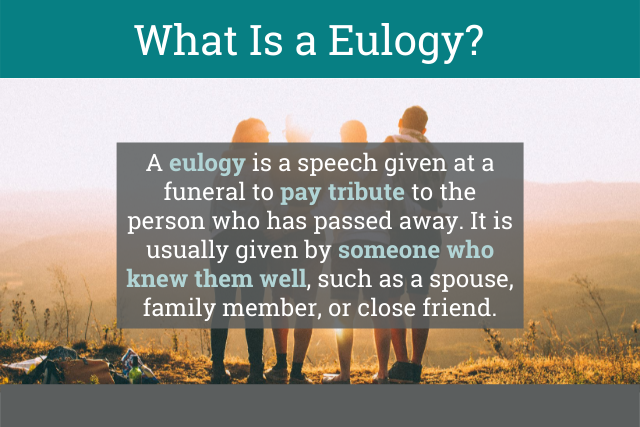
What Is a Eulogy?
A eulogy is a speech given at a funeral to pay tribute to the person who has passed away. Most eulogies are given by someone who knew the deceased well, such as a spouse, family member, or close friend.
The eulogy pays respect to the person who has died by celebrating the life they lived, summoning them into the minds of the audience, and saying farewell to them one last time.
How Long Should a Eulogy Be?
Most eulogies are around three to five minutes long. If you’re unsure about how much you should write, you can ask the funeral director for guidance.
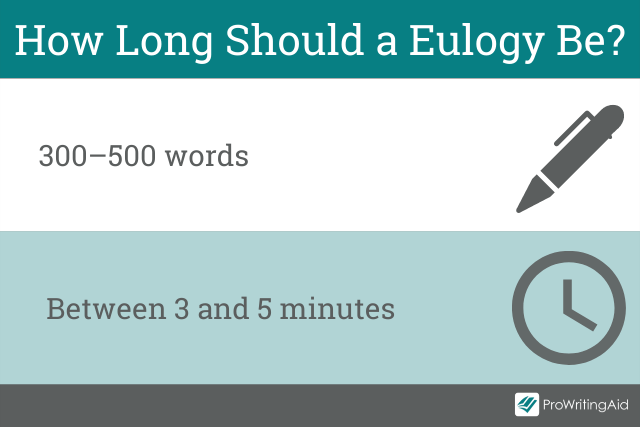
What Do You Need to Do Before Writing a Eulogy?
Before you start writing, it’s important to gather all the material you’ll need.
Take the time to speak with the relatives, friends, and loved ones of the person who has died.
They’ll thank you for including them in the process, and incorporating their perspectives will make your eulogy more powerful.
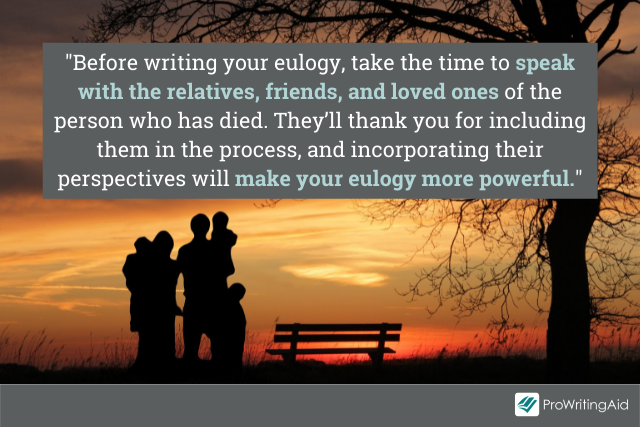
Ask them for their favorite stories about the person, their cherished memories together, and the quirks and personality traits that they loved most.
It’s equally important to think about your own experiences. Looking at old photo albums can help trigger memories.
Then, decide what aspects of that person’s character you want to communicate to the people who have come to mourn them.
What are the most important words you can use to describe their essence?
Once you’ve completed these steps, it’s time to sit down and write the eulogy.
How Do You Write a Powerful Eulogy?
Every eulogy is unique. There’s no right or wrong way to do it—you can honor the life of your loved one in your own way.
We’ve answered nine questions you may have about writing a eulogy below.
1. How Do I Start a Eulogy?
Depending on how big the funeral or memorial service is, you might consider starting the eulogy with a brief introduction of yourself and how you know the deceased.
If you’re a family member, you can describe your relationship.
It’s also important to acknowledge the guest and family members who are attending.
It’s polite to thank the guests for coming, especially those who have traveled a long distance.
Mention the family members of the deceased specifically in your eulogy. You can mention them in a story, or you can thank them specifically. This will be important to them.
2. How Do You Structure a Eulogy?
There’s no easy way to sum up an entire lifetime in a three-minute speech, so it’s important to keep it organized.
Avoid rambling. Structure your eulogy with a beginning, middle, and end so it’s well-organized and simple. Here are some options for how to structure the speech:
- In chronological order: Tell their life story from birth to death
- Using three key points: Choose three important things you want to say, such as three qualities you loved about them or three stories about them
- United under a single theme: Choose one important quality about the person and use all your facts and stories to illustrate that one quality
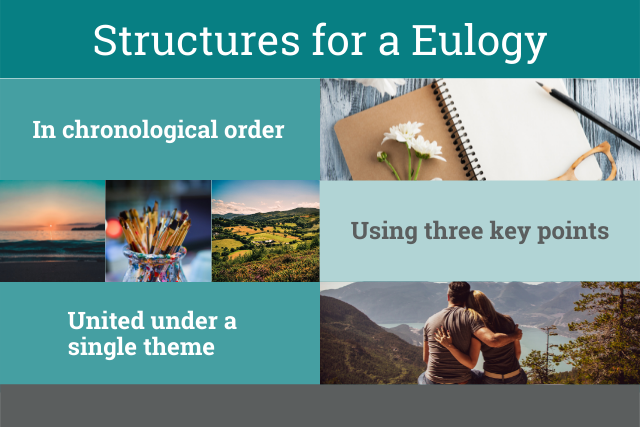
3. What Should You Say About Someone in a Eulogy?
A eulogy isn’t an obituary. It doesn’t need to include the entire timeline of the person’s life. It’s a good idea, however, to mention a few key points.
You might want to mention some of the most essential facts about of the person who has died, such as:
- When and where they were born
- Where they went to school
- Where they worked
- What their favorite hobbies and interests were
- The names of their close family members
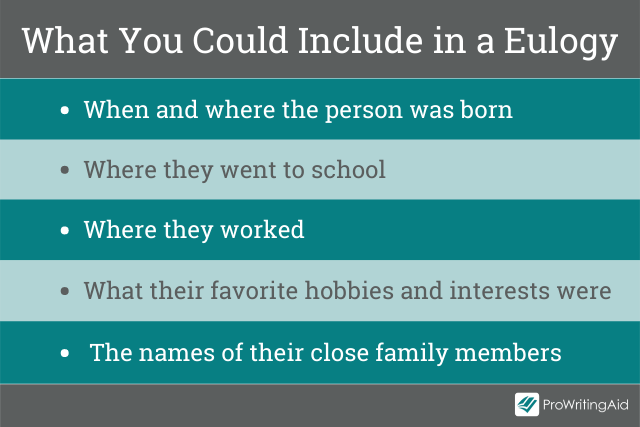
Some eulogies include all of these facts. Others include none. If you don’t mention the facts, you can focus more on the subjective aspects of the person’s character.
One helpful tip is to imagine a stranger is in the audience, someone who hardly knew the person who has died. What would you want to convey?
4. How Do You Choose a Story to Tell in a Eulogy?
It’s useful to include the facts of a person’s life, but it’s even more evocative to tell stories. The more specific the stories are, the better they’ll capture the person you’re honoring.
It can be helpful to use each story to show a character trait that you think was important.
For example, if the person you’re honoring was known for their integrity, talk about the time they told the truth even when it got them in trouble.
If they were known for their compassion, tell a story about the time they helped a stranger at their own expense.
Here are some questions to help you start thinking of stories:
- What are your favorite memories with this person?
- What are the best qualities this person is remembered for?
- When were they happiest?
- How did they meet their spouse?
- What are some little-known stories about them that might show another aspect of their character?
- What stories would they have wanted everyone to hear?
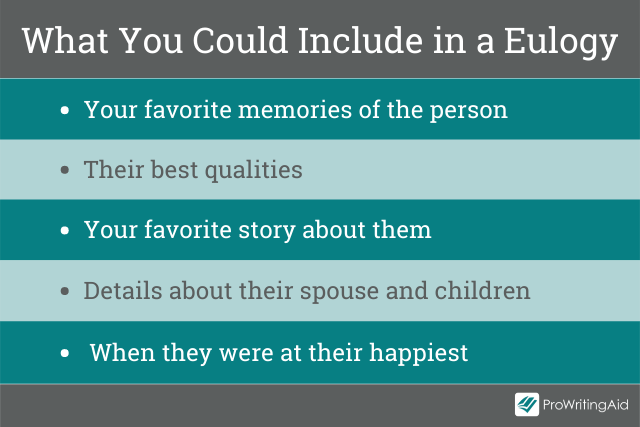
5. What Shouldn’t Be Included in a Eulogy?
Most people will want to hear the good things about the person who has died.
Everybody has their flaws, and while the damage done by those flaws doesn’t go away after death, a eulogy isn’t the right time to focus on the negatives.
If you had a strained or complicated relationship with the person who has died, it’s important to be honest and authentic about your own experiences, but try not to make those aspects the focus of the story.
As much as possible, try to show the person in a good light. Avoid saying anything that would offend or confuse the audience.
Consider the contributions your loved one made to their community. What are the best aspects of the legacy they left behind?

6. Can a Eulogy Be Funny?
It might feel like a eulogy needs to be a serious speech, but light-hearted anecdotes will help the assembly feel more at ease.
If you can think of a funny story that captures the personality of your loved one, you should consider including it in your speech.
However, remember that humor should be used carefully. Don’t make any jokes at the expense of the deceased.
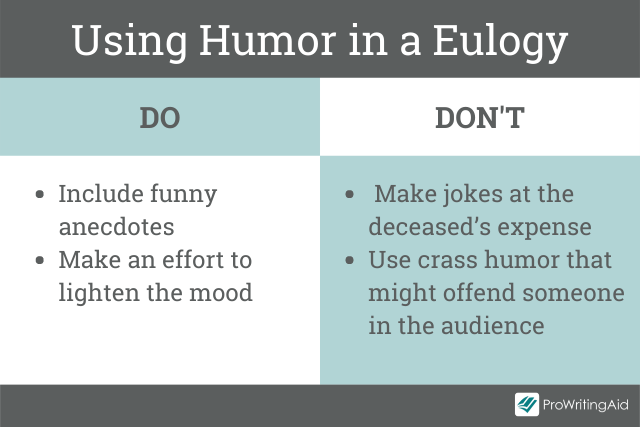
7. How Do You Read a Eulogy Aloud?
Speak slowly, and build in moments to pause and allow the audience to digest what you’ve just said.
The silences are often the most powerful parts of a eulogy, as they give everyone space to reflect together.
8. How Do I Make My Eulogy Unique?
It might be tempting to use words we’ve all heard in eulogies before, such as “We are gathered here today…”
Your eulogy will feel more authentic if you steer away from clichés and, instead, write from the heart.
Use your own words to capture what this person meant to you. Try to be as specific as you can, instead of using phrases and expressions that have been overused in the past.
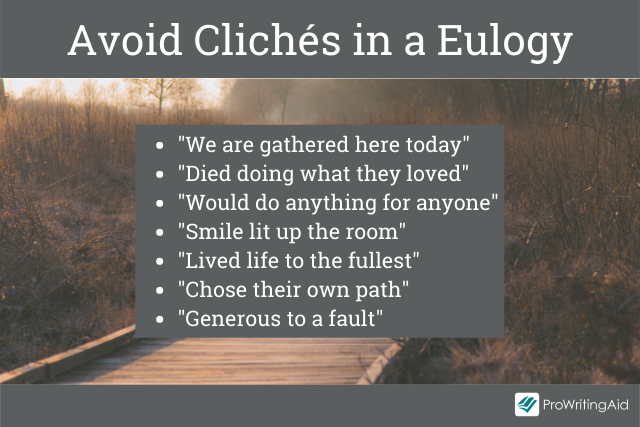
9. How Long Should a Eulogy Be?
You can end with a sweet sentence of farewell, or maybe the last thing you said to them before they died.
When it comes to eulogies, less is more. It’s good to practice giving your speech in advance so you know how long it will run, including the silences.
If it’s over five minutes, think about parts you might be able to cut.
What Are Some Examples of Well-Written Eulogies?
Here are some excerpts from famous eulogies that you can use as inspiration.
Eulogy for Steve Jobs written by his younger sister, Mona Simpson (2011)
When I met Steve, he was a guy my age in jeans, Arab- or Jewish-looking and handsomer than Omar Sharif. We took a long walk—something, it happened, that we both liked to do.
I don’t remember much of what we said that first day, only that he felt like someone I’d pick to be a friend. He explained that he worked in computers.
I didn’t know much about computers. I still worked on a manual Olivetti typewriter. I told Steve I’d recently considered my first purchase of a computer: something called the Cromemco.
Steve told me it was a good thing I’d waited. He said he was making something that was going to be insanely beautiful.
I want to tell you a few things I learned from Steve, during three distinct periods, over the 27 years I knew him. They’re not periods of years, but of states of being. His full life. His illness. His dying.
Steve worked at what he loved. He worked really hard. Every day. That’s incredibly simple, but true. He was the opposite of absent-minded.
He was never embarrassed about working hard, even if the results were failures. If someone as smart as Steve wasn’t ashamed to admit trying, maybe I didn’t have to be.
Read the rest here.
Eulogy for Steve Irwin written by his daughter, Bindi Irwin (2006)
My Daddy was my hero—he was always there for me when I needed him. He listened to me and taught me so many things, but most of all he was fun. I know that Daddy had an important job.
He was working to change the world so everyone would love wildlife like he did. He built a hospital to help animals and he bought lots of land to give animals a safe place to live.
He took me and my brother and my Mum with him all the time.
We filmed together, caught crocodiles together and loved being in the bush together. I don’t want Daddy’s passion to ever end. I want to help endangered wildlife just like he did.
Read the rest here.
Eulogy for Jim Hensen written by his fellow Muppets performer, Frank Oz (1990):
Jim and I were opposites in so many ways.
I think it worked mainly because of patience and understanding, that which we had together both personally and in performance. And in the creative partnership that I shared with him and others.
I knew, not all the time, but in the last fifteen years or so, that he was a very singular human being.
Looking here I think I only realise now how large a man this was. This man that I just worked with and played with, and had so much fun with.
And we did have fun, we had such great silly fun together. The best thing of all—the best thing—is when you watched Jim laugh until he cried.
It usually happened when we were recording something, or performing with the gang ... and we’d get so punch and silly at two in the morning.
And Jim would ... just get that high whine ... and he couldn’t speak, and the tears were rolling down, and he’d try to add to the joke and he just couldn’t do it, and it was the best thing to see because you knew he was always busy and always working under pressure.
And thinking, it was such a purge and a release—it was wonderful, the best thing to see him do that.
Read the rest here.
How to Write an Effective Eulogy
Delivering an effective eulogy is no easy task. However, by following the steps outlined in this article, you can put together a speech worthy of the memory of your loved one.
You may even end up finding the process of writing the eulogy cathartic.
We hope this article has provided some support to you during such a difficult time.


